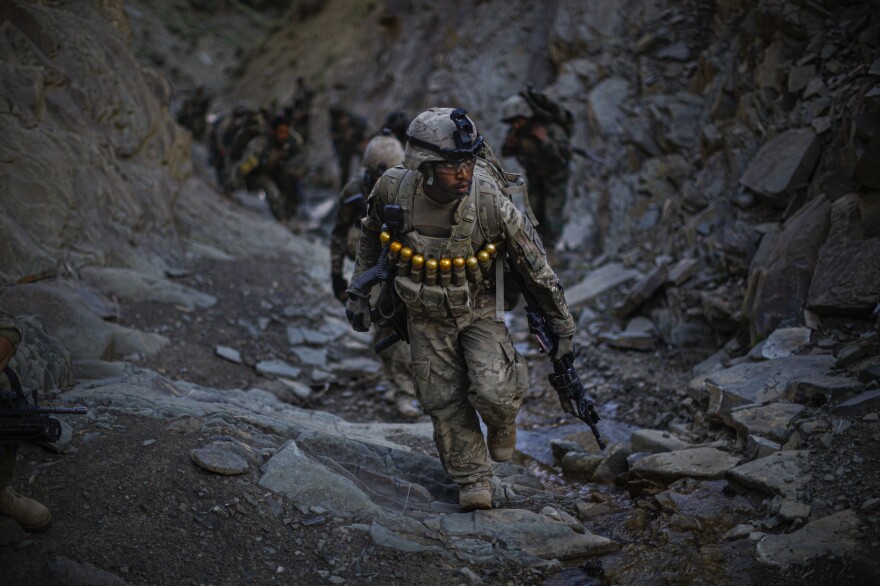Photojournalist David Gilkey was 50 years old when he was killed in an Afghanistan combat zone in 2016.
What he left behind was a body of work that told human stories in moments of desperation and a high standard for the visual work that would come out of NPR, a radio-first outlet. A new book, Pictures on the Radio, collects just a portion of that work across his career.
"I still have a hard time believing he's gone," says photojournalist and editor Coburn Dukehart. "I just keep thinking he's off on assignment."



Dukehart was working as NPR's first picture and multimedia editor when Gilkey was hired as a videographer in 2007, just as the visuals department was getting off the ground. She had met him briefly the year before and initially was "completely intimidated by him."
"His physique and his demeanor, you know, he could be gruff," says Dukehart, who is now digital and multimedia director at the Wisconsin Center for Investigative Journalism.
But as résumés started to get sorted for the videographer job, Gilkey's quickly rose to the top. And as the references were checked, Dukehart was surprised.


"There was a disconnect between what people in his references were saying and what my initial impression of him was," she remembers. "His former co-workers all used words like 'kind,' 'patient,' 'the most wonderful person you'll ever work with,' 'you won't regret hiring him.' "
When Gilkey came on board, Dukehart and the rest of the team quickly got to know the warm heart beneath the gruff exterior. The only problem? Keeping Gilkey busy. Back in 2007, a visuals department for a radio network was uncharted territory.
"The thing about David is he really loved to work," Dukehart says. "I think there was some frustration in the beginning, among all of us, because we were like, 'Who are we as a team? What do we do with him? How do we get him out working?' "

But whether he was shooting studio sessions with NPR Music or documenting the bloody aftermath of a firefight in Afghanistan, Gilkey was "always thinking about the story," Dukehart says. Early on in his tenure with the visuals team, he returned from a video assignment with a batch of photos he had taken on the side, and Dukehart was blown away.
"There's just something about David's work, like when you see it, you know it's his," she says. "There's just something about his work that was so unique to him, that you just always knew that's a 'David Gilkey' in the same way you might look at a Picasso, and say, 'I know that, I know that style.' "
Keith Jenkins, now the senior director of visuals at NPR, joined the team in 2008 as supervising senior producer for multimedia. Pictures on the Radio brings back vivid memories for him, as many of the stories came out of assignments he oversaw.
The first was sending Gilkey to Israel in December 2008. What was supposed to be a low-key assignment on the wall around Gaza was disrupted when violence broke out, in what is now known as the Gaza War.
"My first phone call from him made me realize both the nature of his work and how our relationship was going to develop," says Jenkins. "I remember it as if it was yesterday. It was early evening here in the U.S., and he said, 'I just got shot.'"
While Gilkey photographed the uprising around him, an Israeli sniper had taken note — and shot the camera out of his hands.

Jenkins continues, "I'm thinking, 'OK, if you just got shot, maybe somebody needs to be taking care of you; you should not be calling your boss about this!' "
"He was just a professional's professional," Dukehart says, "and he loved what he did. Like, I don't really think this was a job for him. I think it was a calling."
When Jenkins joined the team, he encouraged Gilkey to pursue that calling as much as possible.

"The first thing that I said to him was, 'I want you to take the types of pictures that you were not able to do when you were working for traditional newspapers. And to do it the way you want to do it,' " Jenkins remembers. "I think the end result is still in evidence today."
Dukehart agrees and points out that while NPR has continued to work with a variety of photographers, Gilkey's staff position still hasn't been filled, almost five years after his death.

"Everybody was moved by his work. Everybody was impressed by his work," she says. "He set the bar — anybody that ever follows him is going to have huge shoes to fill. He just brings the feeling of NPR to the screen. He just nailed it."
That feeling seems to come from the humanity and compassion at the center of Gilkey's work.
"David always cared about the people in front of his camera more than he cared about himself," says Jenkins, the NPR visuals director.
Much of Gilkey's work centered on death, destruction and devastation. But his attitude, Jenkins says, was always, "Here are the people and here's what they're going through. And hopefully something that my pictures can do is make you understand and make you care.'"

"He brings people into his process," says Dukehart. "He gets people to trust him. He makes them feel comfortable. And they, in return, sort of relax and show him a more intimate side."
It's tempting to think of Gilkey as a macho combat photographer, putting himself in the same situations as soldiers and Marines, but without a weapon. And in a sense, that's true.
But both Dukehart and Jenkins say that caricature isn't the whole story. They say that Gilkey was all talent and no ego; that the way he approached all aspects of his life was with beauty as the priority; that intimacy and access, when combined with his painterly eye, yielded a volume of work that showcases the stories of real people in moments of real desperation.
"David always joked about not wanting to be part of that group of photographers that everybody recognized as the war photographers, who all palled around and hung out together," Jenkins remembers. "It was less about him, and it was more about the pictures and the people. And my hope is that the humanity in his images is what people remember."
Gilkey was recognized for his work with an array of media and journalism's most prestigious awards: a Peabody, a Murrow and an Emmy, among others.
"But I don't think he really cared," Dukehart says, laughing.
"The legacy is the people he photographed. His relationship with them, his work with veterans, showing them in just these honest, raw situations, showing their vulnerability," she continues. "Any person that would see themselves in his work, I think, would appreciate the honesty that he brought to their stories."

Melody Rowell is a writer and podcast producer living in Kansas City, Mo. You can follow her on Twitter @MelodyRowell.
Copyright 2023 NPR. To see more, visit https://www.npr.org.







